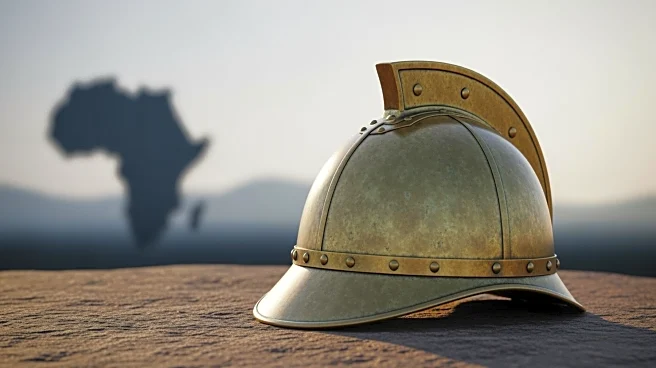What's Happening?
The Commonwealth War Graves Commission (CWGC) has uncovered records of Kenyan soldiers who served in the British army during World War One and World War Two. These records, previously thought to be lost,
include details of soldiers like Mutuku Ing'ati, who left his home in southern Kenya and was never seen again. Ing'ati, along with thousands of other Kenyans, fought in the British army but died without their families being notified. The CWGC is working to commemorate these soldiers and has contacted relatives like Benjamin Mutuku, Ing'ati's nephew, to share newfound information. The records reveal the involvement of East African soldiers in significant battles, including those against German troops in Tanzania and Japanese forces in Myanmar.
Why It's Important?
This discovery sheds light on the significant yet overlooked contributions of African soldiers in global conflicts. The records provide a sense of closure for families who have long wondered about the fate of their relatives. The CWGC's efforts to commemorate these soldiers aim to rectify historical oversights and ensure that the sacrifices of African soldiers are recognized alongside their counterparts. This initiative also seeks to integrate these stories into educational curricula, fostering a broader understanding of Africa's role in world history. The project highlights the importance of preserving historical records and acknowledging diverse contributions to global events.
What's Next?
The CWGC plans to continue its efforts to locate and commemorate the resting places of these soldiers. There is an ongoing search for more records, with the aim of building memorials to honor the identified soldiers. The organization also intends to collaborate with educational institutions in Kenya to incorporate these historical narratives into the school curriculum. This initiative is expected to continue indefinitely, as the CWGC is committed to ensuring that the memories of these soldiers are preserved for future generations.
Beyond the Headlines
The project raises important questions about historical memory and the recognition of marginalized groups in global narratives. It underscores the ethical responsibility to acknowledge and honor the contributions of all individuals, regardless of their background. The initiative also highlights the potential for historical research to foster reconciliation and healing by addressing past injustices and omissions.









